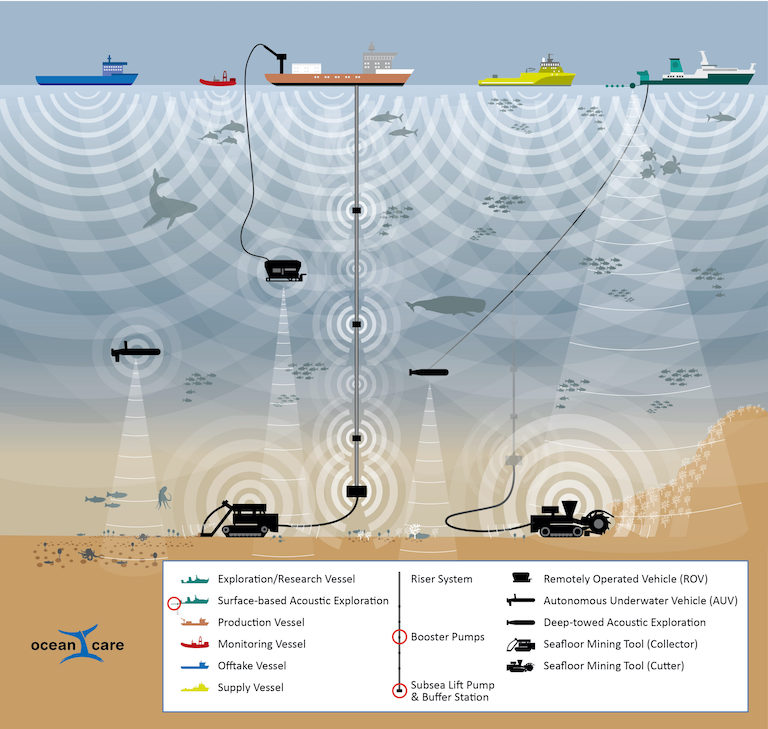Deep sea mining: Is anybody listening?
Saturday 30 September 2023 | Written by Te Ipukarea Society | Published in Environment, National

Deep sea mining can prove a noisy affair, says Te Ipukarea Society. Infographic_OceanCare_2021/23092901
There will be many impacts of deep sea mining. Some will be very difficult to predict.
We currently have three companies licenced to conduct deep sea mining exploration in the Cook Islands, with the expectation that they will move to a full-scale mining licence in just a few more years.
This deep sea mining would involve the extraction of polymetallic nodules from the seabed.
These resources are of great interest due to their valuable components, including metals like cobalt, nickel, copper and manganese which are sought after for various high-tech industries such as battery manufacture and also for military uses.
This push for deep sea mining has emerged as a contentious issue in recent years, drawing significant attention from environmental organizations, including Greenpeace, the International Union for Conservation of Nature (IUCN), WWF, the Deep-Sea Conservation Coalition, the Deep Sea Mining Campaign, and, locally, Te Ipukarea Society and Kōrero o te 'Ōrau.
Concerns have been raised about this extractive industry’s potential impact on marine life. A lot of this concern is around the destruction of habitat and also the impacts of the sediment plumes.
However, another impact that is perhaps less obvious but no less damaging is the that of underwater noise emissions.
Much of this noise is generated during the extraction process and comes from several sources:
Remotely Operated Vehicles (ROVs) and Autonomous Underwater Vehicles (AUVs) which are used to collect samples, monitor equipment, and perform various tasks on the ocean floor.
These vehicles emit noise that is very foreign to the silence of the deep ocean through their propulsion systems and equipment operations.
The process of extracting minerals will involve dredging the seabed. The mechanical action of this machinery undertaking the mining produces significant noise, which can travel over long distances in the underwater environment.
The transfer of mined materials to the surface also creates noise. Lift systems and pipelines can generate substantial sound when transporting minerals to the mining vessel.
Noise in the underwater environment behaves differently than it does in the air, travelling much further and faster, at almost five times the speed of sound in air.
Low frequencies can, under certain conditions, be heard over distances of thousands of kilometres in the ocean. This distinction has important implications for marine life, including:
Disruption of Behaviour: Many marine species, such as whales, dolphins, and fish, rely on sound for communication, navigation, and finding food. Increased ambient noise from mining activities can disrupt these crucial behaviours, potentially leading to disorientation and stress. Chronic exposure to elevated noise levels can harm their health, interfere with mating and migration, and lead to stranding events.
Habitat disruption: The noise generated by mining operations can disrupt the seabed and the ecosystems that depend on it. Sediments stirred up can smother delicate organisms and disrupt the balance of these deep-sea environments.
Fish and Invertebrates: Noise pollution can also affect fish and invertebrates, potentially causing changes in their behaviour, reproductive success, and population dynamics. Some species may avoid areas with high noise levels, impacting their distribution. According to Lindy Weilgart, marine biologist at Dalhousie University in Canada, around 150 marine species have shown to be impacted by noise, so there is no longer any doubt that underwater noise is a harmful and a serious pollutant.
She believes adding another source of constant and loud noise from deep seabed mining, without further research about the impacts and without significant efforts to reduce the noise, would be utterly irresponsible.
Deep sea mining presents a complex challenge for proponents and conservationists alike. The underwater noise emissions associated with mining activities have the potential to disrupt marine ecosystems and harm species crucial to ocean health.
As our understanding of this issue grows, it becomes increasingly important to ensure that the environmental impacts of deep seabed mining, including noise pollution, are well researched by independent entities before any consideration is given to begin commercial mining.












































